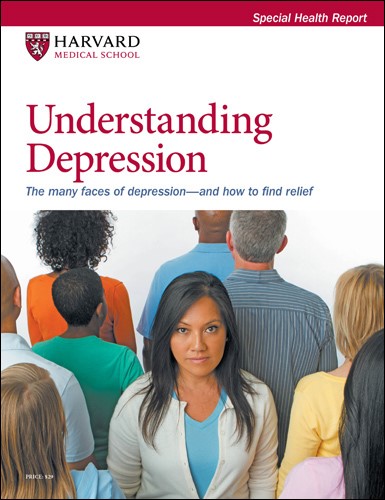Tapering off antidepressants sensibly
Going cold turkey on depression medications can be a bumpy ride.
- Reviewed by Toni Golen, MD, Editor in Chief, Harvard Women's Health Watch; Editorial Advisory Board Member, Harvard Health Publishing; Contributor

Nearly 13% of American adults — two-thirds of them women — take antidepressants. That puts these mood medications among the most-prescribed drugs in the United States.
While antidepressants can be extremely effective and safe, it's well established that they don't help everyone, proving effective in only about half of those taking them. The drugs, which alter brain levels of chemical messengers affecting mood, can also trigger side effects ranging from low sex drive to weight gain to trouble sleeping. They usually aren't meant to be taken indefinitely, either.
"Very often, patients stay on an antidepressant with little thought given to whether they can discontinue the medication," says Dr. Richard Schwartz, a psychiatrist at Harvard-affiliated McLean Hospital. "That's probably a bad idea."
Is there a right or wrong time to go off antidepressants? And what happens if you simply stop taking them? We asked Dr. Schwartz for his perspective on when and how to taper off depression medications.
Q. Is there a rule of thumb guiding how long a person should take an antidepressant?
A. If an antidepressant works, evidence suggests it's probably best to stay on the medication for at least four months after you're feeling well. Discontinuing your antidepressant sooner than that comes with a significantly increased risk of depression recurrence. Most people are able to stop medication after a single episode of depression — particularly if the situation that contributed to it has since passed. The more episodes of depression someone has had, the harder it is to successfully taper off antidepressants.
Q. What reasons might cause people to decide they want to stop taking antidepressants?
A. Some people just conclude, "I'm fine. I don't need this anymore." And they may be right. Others experience side effects they no longer want to tolerate. And some simply don't like the idea of being on a medication indefinitely and just want to be free of that. Ideally, before they come off, they should speak with their doctor about it — not just stop on their own.
Q. What else should shape this decision?
A. I would want to know whether they've been on medication long enough so that, statistically, stopping it is least likely to lead to a recurrence of depression. They should look at what's going on in their lives in the upcoming weeks and months and not stop taking antidepressants at a time when something stressful is happening. They shouldn't do it when they're about to start a new job, for example. We don't want a period of depression to coincide with a bad time to be depressed.
Q. What can happen if you go cold turkey on antidepressant use? Is it dangerous?
A. No, it's not dangerous, though stopping all at once might increase the possibility of depression coming back. But withdrawal symptoms can be very uncomfortable and disconcerting at first, especially if you've been on antidepressants for a while. (See "Reasons to FINISH taking antidepressants gradually.") Most people won't experience withdrawal symptoms, even if they stop taking their medication abruptly — but you don't know if you're going to be in that group.
Reasons to FINISH taking antidepressants graduallyA clever mnemonic explains the most common withdrawal symptoms from suddenly stopping antidepressants: F: flu-like syndrome that involves headaches, joint and muscle pain, and fatigue I: insomnia N: nausea I: imbalance, which may include dizziness or lightheadedness S: sensory disturbances such as tingling or electric shock–like sensations some people describe as "brain zaps" H: hyperarousal, defined as feeling edgy, irritable, or anxious. |
Q. How can people boost their odds of success in stopping their medication?
A. They should talk to their doctor for a personalized approach and expect to do it over a period of weeks to months. It varies by medication and dose, but the process involves a series of reductions in dosage.
It's important to know that antidepressants aren't the only thing that combats depression. Many other measures have been demonstrated to be effective. Psychotherapy, regular exercise, sleep, and socializing with others are all powerful ways of intervening that are comparable to depression medications.
Image: © kieferpix/Getty Images
About the Author

Maureen Salamon, Executive Editor, Harvard Women's Health Watch
About the Reviewer

Toni Golen, MD, Editor in Chief, Harvard Women's Health Watch; Editorial Advisory Board Member, Harvard Health Publishing; Contributor
Disclaimer:
As a service to our readers, Harvard Health Publishing provides access to our library of archived content. Please note the date of last review or update on all articles.
No content on this site, regardless of date, should ever be used as a substitute for direct medical advice from your doctor or other qualified clinician.
















